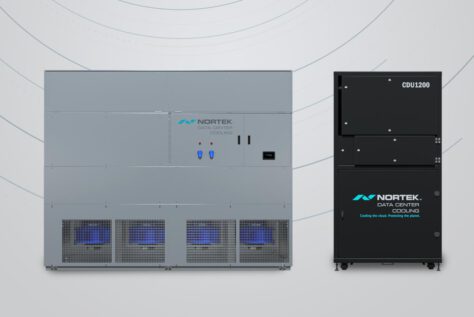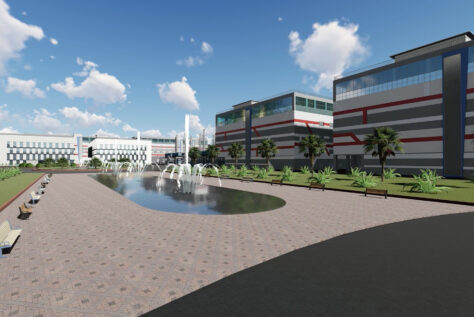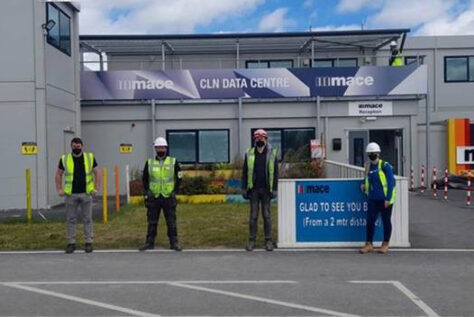New S$23 million programme to pioneer green and efficient cooling solutions for data centres located in the tropics to operate optimally
The National University of Singapore (NUS) and Nanyang Technological University, Singapore (NTU Singapore), together with key stakeholders in Singapore’s data centre industry, have established a new S$23 million research programme to develop innovative and sustainable cooling solutions for data centres located in tropical locations. A state-of-the-art testbed facility will be set up in NUS to promote co-creation and demonstration of such advanced cooling technologies.
The new Sustainable Tropical Data Centre Testbed (STDCT) – the first of its kind in the tropics – will serve as an innovation hub for the academia and industry to work together to future-proof the region’s data centre industry. Curated by the Cooling Energy Science and Technology Singapore (CoolestSG) Consortium hosted at NUS, this programme will see researchers develop and demonstrate energy-efficient cooling technologies to achieve breakthroughs in the tropical data centre environment. The testbed facility is expected to be operational by 1 October 2021.
This programme is jointly funded by the National Research Foundation Singapore (NRF), and anchor industry partner Facebook. The research is led by NUS and NTU, and supported by Infocomm Media Development Authority (IMDA). Five other industry partners involved are Ascenix Pte Ltd, CoolestDC Pte Ltd, Keppel Data Centres, New Media Express Pte Ltd, and Red Dot Analytics Pte Ltd.
Growing demand for efficient and sustainable data centres
The rise of the digital economy has led to growing demand for data centres that house computing and data storage infrastructure. As computer servers generate a lot of heat, these data centres are currently air-cooled at temperatures between 23 and 27 degrees Celsius, and at ambient humidity of 50 to 60 per cent as the industrial practice.
Maintaining such controlled environments require high energy consumption, resulting in high cost and carbon emissions – particularly for tropical countries like Singapore.
Singapore supplies about 60 per cent of the data centres located in Southeast Asia. Data centres in Singapore consume almost 7 per cent of the country’s total energy needs, a figure projected to reach 12 per cent by 2030. Thus, there is increasing need to reduce power consumption and carbon footprint in packing more computing power within the same floor area, while developing solutions to sustain the cooling demands of data centres.
Professor Low Teck Seng, NRF’s Chief Executive Officer, said, “Data centres are the backbone of the digital economy and they require constant cooling for optimal operations. The new Sustainable Tropical Data Centre Testbed will accelerate the development and testbedding of innovative and sustainable solutions for data centres, towards commercial deployment. As part of our Energy Grid 2.0 programme, the testbed facility will also support Singapore’s journey towards becoming a low-emissions economy.”
The STDCT and its research activities will be jointly led by Programme Director Associate Professor Lee Poh Seng from the NUS Department of Mechanical Engineering, together with Professor Wen Yonggang, Associate Dean (Research) at NTU’s College of Engineering.
“Data centres are a critical enabler of the digital economy, but the average data centre can exert a significant environmental burden. Aligned with RIE 2025, sustainability is a key research focus of NUS, and our researchers have deep expertise in developing integrated solutions for tropical, urban and Asian settings. NUS is excited to lead the new STDCT, which is a timely initiative that brings together the capabilities and experience of the academic community and the industry to achieve a common goal of co-developing new technologies to reduce energy consumption and greenhouse gas emissions of tropical data centres, while optimising their operations,” said Professor Chen Tsuhan, NUS Deputy President (Research & Technology).
NTU’s Senior Vice President (Research) Professor Lam Khin Yong, said, “Data centres are the backbone of Singapore’s national digital transformation, and there is a need to improve their energy efficiency and sustainability as we continue to grow as a data centre hub. On the NTU Smart Campus, our scientists have pioneered award-winning Artificial Intelligence technologies to tackle these challenges as part of the NTU 2025 strategic plan and will adapt them for trials at the Sustainable Tropical Data Centre Testbed. The initiative is a national open innovation platform where academia and industry players jointly develop and testbed new cooling technologies that will benefit the entire data centre ecosystem.”
Mr Alex Johnson, Vice President, Infrastructure at Facebook, said, “Facebook designs some of the most energy and water efficient data centres in the world. We are excited about the opportunity to partner NUS, NTU, Keppel Data Centres and the CoolestSG community to develop innovative solutions that reduce the carbon footprint and energy consumption of the average data centre, particularly those located in tropical areas like Singapore.”
Mr Yeo Tiong Yeow, Cluster Director (Infrastructure Planning & Facilitation), IMDA, said: “The digital economy continues to generate and use data at exponential rates. We will work closely with industry to push technological boundaries to bring about more energy efficient data centres and encourage the adoption of best-in-class technologies, solutions and standards. This will enable us to grow our data centre ecosystem sustainably and further entrench Singapore as one of the world’s leading data centre hubs.”
Cutting-edge infrastructure
The new STDCT will be housed on NUS Kent Ridge campus. The new facility will house state-of-the-art equipment such as a novel desiccant-coated heat exchanger design, and a StatePoint Liquid Cooling System (SPLC). The SPLC, developed by Nortek Air Solutions in partnership with Facebook, helps data centres operate more efficiently in tropical locations.
The combination of these technologies will enable a more energy-efficient cooling solution for buildings in a tropical climate which make use of ambient air that is otherwise hot and humid. Innovative chip-level hybrid cooling will be adopted to keep the servers cool. Smart operation of these technologies using Artificial Intelligence (AI), with the digital twin capability, will not only be more water and power efficient, but will also ensure the longevity of the data centre’s equipment and servers in the long run.
This flexible and full-scale live data facility enables the identification of potential operational risks of the solutions being tested, so that de-risking measures that are well-suited for the tropical climate can be designed.
The STDCT will be part of the NUS Living Laboratory, a strategic initiative to transform NUS into a major testbed for pilots and trials at a scale that has not been possible in the past. This will facilitate the translation of scientific discoveries in the laboratory into useful technologies and capabilities for solving real-world problems and industry applications.
Synergistic research and collaboration
Research at the STDCT will be co-led by researchers from both NUS, NTU and data centre industry partners, with active inputs from relevant government agencies. Companies will share their needs and requirements with the research community to ideate and innovate the solutions.
STDCT’s research activities are organised under four work packages, namely:
1. Air-cooled Tropical Data Centre 2.0
Led by Associate Professor Tan Rui from NTU’s School of Computer Science and Engineering, this research investigates the raising of data centre air-cooling temperatures and relative humidity levels to reduce energy consumption while preserving the reliability and performance of IT equipment. The work will provide valuable data points on the optimum temperature and humidity setpoints for setting air-cooling standard for data centres in the tropics.
2. Desiccant-Coated Heat Exchanger-enhanced Indirect Evaporative Cooling for Tropical Operations
This research led by Professor Seeram Ramakrishna from the NUS Department of Mechanical Engineering aims to validate the performance of the proposed alternative cooling technologies under real operating conditions. Based on the results, optimal operating guidelines can be derived, enabling widespread adoption with the minimal operational and financial risks.
3. Direct Chip Hybrid Cooling
Headed by Assoc Prof Lee, this research examines a heat sink design with two modes of cooling, i.e. air and liquid cooling, in a single integrated piece which eliminates the connectors and ducts. This can serve as an alternative air-cooling solution during water-loop maintenance to significantly reduce the server downtime.
4. Cognitive Digital Twin
A key feature of next-generation data centres is the ability to operate new cooling solutions which are digitalised to enable real-time monitoring and AI-based optimisation. The team under Prof Wen will work on the synergistic integration of the different innovative cooling technologies.
The demonstration and validation of innovative cooling technologies at the testbed facility can greatly mitigate the operational and financial risks of adopting these solutions. This will accelerate adoption, as well as enhance the sustainability of the data centre industry in Singapore and the wider tropical region.
A combination of these innovative cooling technologies, when they are successfully developed and tested, could significantly reduce energy consumption as well as greenhouse gas emissions up to 25 per cent, as compared to conventional data centres which are traditionally air-cooled. If adopted industry-wide across the entire tropical region, energy usage of the data centre industry could potentially be lowered by at least 40 per cent.
In the longer term, the STDCT envisions recommending operating guidelines, and setting new standards based on proven findings from the new technologies, for greener data centre operations.
Source: https://news.nus.edu.sg/nus-and-ntu-launch-first-of-its-kind-tropical-data-centre-testbed/







